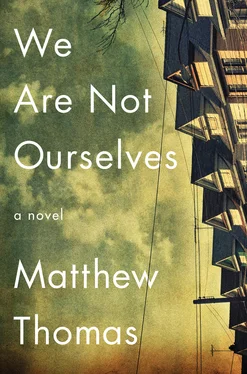• • •
When he entered the lobby of the building on Park Avenue, he beheld a scrawny kid in an ill-fitting doorman’s uniform looking as if he was playacting in his father’s clothes, and another in a porter’s outfit giving a sopping mop a desultory pass over the tiles. “Where did you go to high school?” he asked the kid at the control panel, and he cringed to see that familiar mix of deference and condescension in the kid’s eyes that said that this was a pit stop for him. The kid confirmed his suspicion: there had been a steady stream of graduates since his own stint.
He asked for Mr. Marku. The kid spoke into the intercom in a muted voice that strained after maturity, and a few minutes later Mr. Marku emerged from his apartment and hugged Connell with a warmth that caught him off guard. They went into his office. The fish in the tank were smaller now, but there were more of them, and they were more colorful.
“You’re feeling well,” Mr. Marku said, lighting a cigarette. “You’re looking well. You finally shaved.” He rubbed his hand on his own chin, his eyes betraying his delight. “You came to pay me a visit.”
“And to see about something,” Connell said. “About work.”
Mr. Marku gave him a long look. “You’re finished college.”
Connell clicked a pen on his thigh. “Yes.”
“You want to come back here.”
“I do,” he said. “I’m sorry about how things ended.”
Mr. Marku waved his hand as if swatting away a fly. “Summer work.”
“I was thinking beyond that,” Connell said.
“You have other options. A smart kid like you.”
“I’ll do a good job,” Connell said. “I’ll do a better job than before.”
Mr. Marku stopped blinking, his lightly appraising gaze shifting into a harder stare.
“These guys have wives, families, bills. It’s a steady paycheck for them, a respectable job. Maybe not for you.”
“No more books,” Connell said. “I won’t read, I’ll wear the hat. I’ll shave every day. I know the ropes.”
Mr. Marku shook his head. Maybe he was remembering Connell’s flaws — the tardiness, the way he nosed his way into people’s business in the building, how he sat down at every opportunity.
“I’m not a kid anymore,” Connell said. “I get it now. I’ll never be late, I’ll keep my mouth shut and my nose down. I won’t ever sit down.”
Mr. Marku laughed. “Even I sit down.” He shook his head again, but this time it seemed as if he was trying to work it out. “I don’t have anything full-time.”
“Anything,” Connell assured him.
“You want to look somewhere else with your college degree,” he said. “This doesn’t make any sense.”
“I like it here,” Connell said. “I don’t want to go to an office, sit at a desk all day, push paper.”
A long silence followed, punctuated by a sudden frenzy of activity in the fish tank.
“You’ll show up tomorrow at eleven forty-five,” Mr. Marku said finally.
“Thank you, sir.”
“Summer work,” he said, and Connell nodded. “That’s all I have. Then you have to move along.”
• • •
Connell covered for the doormen when they rotated out on vacation, or else worked by the service entrance gate, where he logged the entrances and exits of the crews and ran the A elevator line. He’d earned more money three years before, but since then the union had struck, and a concession had been made toward a hierarchy of seniority. The summer relief rate was now only eighty percent of the fully vested rate. He would have to wait a year to make what the other guys made, but he was fine with it; maybe they’d look at him as less of an upstart that way.
He kept his face shaved and his hair cut short and wore the hat. The high school kids deferred to his seniority, regarding him with wary politeness. They saw him, he suspected, as a man who’d fallen through a sinkhole in his life.
At the beginning of August, a beloved doorman and tribal elder known variously as Scottish John, the Scotsman, and Scottie, though never simply John, retired to a little salute of cake and coffee after thirty years on the seven-to-three shift, leaving a vacuum of leadership. Mr. Marku called Connell into his office.
“Tell me how long you plan to stay here.”
“How long can I? I thought my time ran out in September.”
Mr. Marku luxuriated in a pause. “You’ve come back to make things right.”
Connell felt an uneasy gratitude hearing this declaration and looked at Mr. Marku in silence.
“You’ll show up tomorrow morning at six forty-five,” Mr. Marku said.
“Scottie’s shift?”
Mr. Marku nodded. Connell nodded back, feeling as if he’d graduated into adulthood. Seven-to-three was the only shift that presented a modicum of complexity, with shareholders leaving for work and school, nannies and contractors reporting for duty, packages arriving, and mailmen dumping teeming bags of mail to be sorted into little cubbyholes in a big rolling sorter.
After a little while, he saw a subtle shift in the way the full-timers related to him, as if he were separating himself from the gently self-absorbed youths around him, whom he covered for whenever he could, masking their incompetence at practical matters and wringing what assistance he could out of them the way any doorman would. When they went to college in September, he felt he’d become one of the regular guys. The only difference between him and the other doormen was that during breaks he read books instead of the newspaper, and he didn’t bullshit in the locker room during lunch but took walks around the neighborhood, peered into the Guggenheim Museum, or sat at restaurants with a book open before him.
He became a reliable fixture in the lobby. He knew all the shareholders’ names and apartment numbers. He knew the names of their kids who came home from college on the weekends. He knew their nannies’ names, the names of their masseuses who arrived with portable tables, the names of the lovers they never discussed. He kept their secrets and knew the front desk like a mole knows its burrow. As soon as a familiar figure appeared in front of the building, he had his finger on the button to hold open the appropriate elevator door. When someone unfamiliar approached, he had the intercom receiver in his hand, ready to put it to his ear and hit the proper buzzer.
He could tell his presence made a few shareholders uncomfortable. It would have been easier for them if he spoke halting English or hadn’t gone to college or hadn’t gone to a good college or looked a little Balkan or Mexican. To avoid fanning the low flame of their unease, he talked as little as possible about himself. The summer kids were one thing; they caused a temporary ripple in the waters of class identity and were tolerated, even indulged. By collecting a decent check and moving along to good schools, sometimes even schools the shareholders’ children didn’t get into, they confirmed the rightness of the shareholders’ way of life and the durability of their meritocratic ideals.
His mother pressed him about graduate school or another line of work. How could he explain that he’d never finished college, after all the money she’d spent on his education? He heard her talking as though through a body of water, the sounds muffled by some mysterious viscosity in his spirit. He felt his mind working slowly, his imagination straining. He felt himself becoming thicker all over.
The one purely bright spot in his failed last year of college had been the time he’d spent tutoring Delores. He started giving time to Mr. Marku’s kid Peter, who was in eighth grade now and hadn’t gotten anything lower than a ninety since third grade. Connell drilled him on vocabulary words and sat him in the little room off the lobby and made him practice taking standardized tests.
Читать дальше
Конец ознакомительного отрывка
Купить книгу












